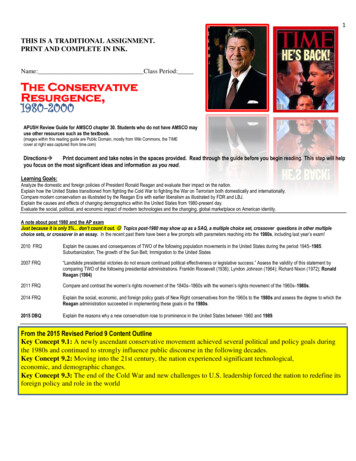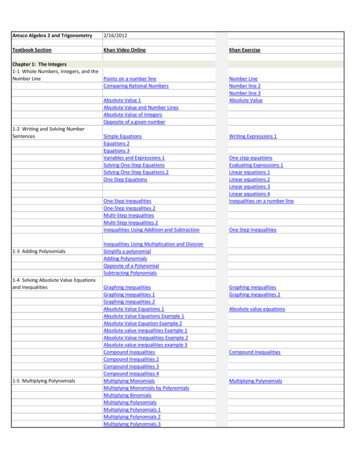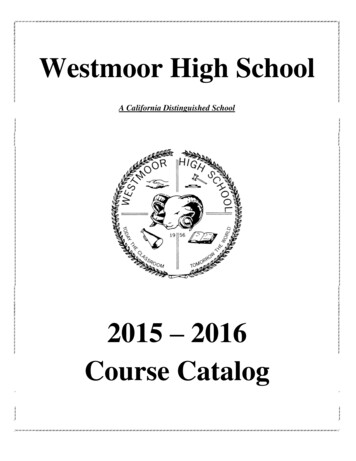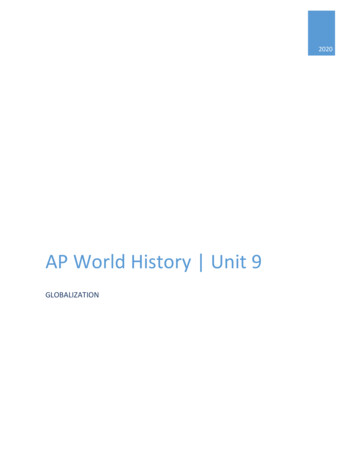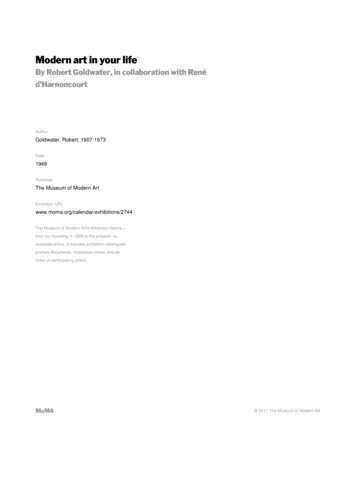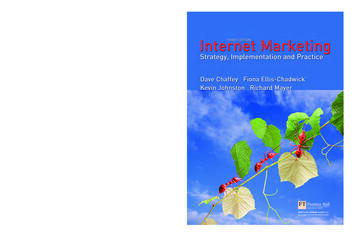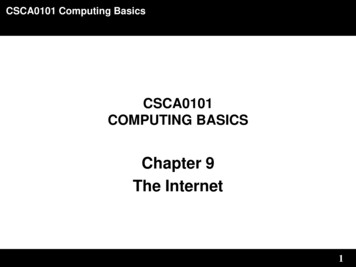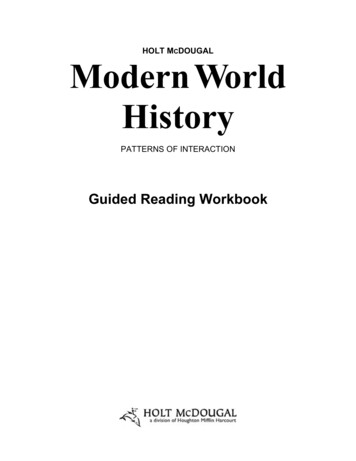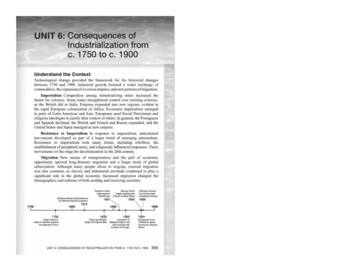
Transcription
c. 1750 to c. 1900Understand the ContextTechnological change provided the framework for the historical changesbetween 1750 and 1900. Industrial growth fostered a wider exchange ofcommodities, the expansion of overseas empires, and new patterns of migration.Imperialism Competition among industrializing states increased thedesire for colonies. Some states strengthened control over existing colonies,as the British did in India. Empires expanded into new regions, evident inthe rapid European colonization of Africa. Economic imperialism emergedin parts of Latin American and Asia. Europeans used Social Darwinism andreligious ideologies to justify their control of others. In general, the Portugueseand Spanish declined, the British and French and Russia expanded, and theUnited States and Japan emerged as new empires.Resistance to Imperialism In response to imperialism, anticolonialmovements developed as part of a larger trend of emerging nationalism.Resistance to imperialism took many forms, including rebellion, theestablishment of peripheral states, and religiously influenced responses. Thesemovements set the stage for decolonization in the 20th century.Migration New means of transportation and the pull of economicopportunity spurred long-distance migration and a larger trend of globalurbanization. Although many people chose to migrate, coerced migrationwas also common, as slavery and indentured servitude continued to play asignificant role in the global economy. Increased migration changed thedemographics and cultures of both sending and receiving societies.SePeople in indiarebel againstGrit rule.1857Samory Tore Ratlroad workersbegins fighting te —s fron india beginFrenchin West Africa.1883travelingto Kerya.18861900178018391865Tupac Amaru 8leads a rebation ageinatChina and BritainLeopold ffofbeginfirst Opium War, Belgium begins rulethe Spanish in Peru.and oversees theinvasion of Congo.1884mectin Bartinto agreeon how to colonizeAfricaUNIT 6: CONSEQUENCES OF INDUSTRIALIZATION FROM C. 1750 TOC. 1900365
Topics and Learning Objectives6.1Topic 6.1: Rationales for Imperialism pages 367-374A: Explain how ideologies contributed to the development ofimperialism from 1750 to 1900.Rationales for ImperialismTopic 6.2: State Expansion pages 375-387B: Compare processes by which state power shifted in various parts ofthe world from 1750 to 1900.Topic 6.3: Indigenous Responses to State Expansionpages 388-398C: Explain how and why internal and external factors have influencedthe process of state building from 1750 to 1900.Topic 6.4: Global Economic Development pages 399-406D: Explain how various environmental factors contributed to thedevelopment of the global economy from 1750 to 1900.Topic 6.5: Economic Imperialism pages 407-416Take up the White Man's Burden—Send forth the best ye breed—Go bind your sons to exileTo serve your captives’ need;To wait in heavy harness,On fluttered folk and wild —Your new-caught, sullen peoples,Haif-devil and half-child.—Rudyard Kipling, “The White Man's Burden,” 1899Essential Question: What ideologies contributed to the development ofimperialism between 1750 and 1900?E: Explain how various economic factors contributed to the developmentof the global economy from 1750 to 1900.Topic 6.6: Causes of Migration in an Interconnected Worldpages 417-428F: Explain how various environmental factors contributed to thedevelopment of varied patterns of migration from 1750 to 1900.G: Explain how various economic factors contributed to the developmentof varied patterns of migration from 1750 to 1900.Topic 6.7: Effects of Migrationpages 429-438H: Explain how and why new patterns of migration affected society from1750 to 1900.Topic 6.8: Causation in the Imperial Age pages 439-442I: Explain the relative significance of the effects of imperialism from1750 to 1900.Raayara Kipling was an English writer who spent his youth in Britishcolonial India. The speaker in his poem urged the whites of Western countriesto establish colonies for the good of the “inferior” people of the word. WhetherKipling actually supported this idea is not clear, but his poem was used to justifyit. Proponents justified European colonization using a variety of explanations,from a belief in nationalism, a desire for economic wealth, a sense of religiousduty, and a belief they were biologically superior. These various motives forestablishing overseas empires—a policy called imperialism—would lead toconflicts in Asia and a scramble to colonize Africa. (See Topic 6.2.)Nationalist Motives for ImperialismIn Western Europe, revolutions, the rise of nationalism, and the creation ofnation-states characterized much of the 1800s. With a strong sense of identityand loyalty to a state, many world powers boldly asserted authority over otherterritories. Building an empire in Asia or Africa was one way for a country toassert its national identity in the global arena. Britain, France, Spain, Portugal,and the Netherlands would long possess overseas colonies.European Nationalism After losing its American colonies, Britain lookedfor new lands to open to settlement. In 1788 the first British settlers arrived inthe colony of New South Wales on the east coast of the island continent of New366WORLO HISTORY MODERN: AP* EDITIONRATIONALES FOR IMPERIALISM367
Holland—today’s Australia. (See Topic 6.2.) Britain was also expanding itsinfluence in South Asia, gradually taking control of India from the East IndiaCompany. By 1857 Britain controlled the entire Indian subcontinent. Ceylon(Sri Lanka), Burma (Myanmar), the Malay States (which included Singapore),and parts of Borneo in Southeast Asia were also under British control.France compensated for its humiliating defeat by Prussia in the FrancoPrussian War (1870-1871) by expanding its overseas territories. It had alreadyoccupied Algeria in Northern Africa, New Caledonia and other islands in theSouth Pacific, Senegal in Western Africa, and Indochina in Southeast Asia.Italy and Germany were newly unified states in the late-19th century.Each wanted colonies not only for economic and strategic reasons but alsofor prestige. However, neither began acquiring an empire until the mid-1 880s.While Spain had led the quest for colonies in the first wave of imperialismduring the 16th and 17th centuries, its power was greatly diminished by the19th century. It did not play a dominant role in this second wave of imperialism.Japan in East Asia Japan asserted its nationalist pride through incursionsinto Korea. This irritated China, a country that had exerted a strong presencein Korea for centuries. The conflict grew into the Sino-Japanese War (1894—1895). Japan’s victory gave it control of Korea. Japan also seized Taiwan,which was known as Formosa from the time of Portuguese colonization in the16th century until the end of World War IT. (Connect: Identify three events ofthe late 19th and carly 20th centuries that encouraged the growth of Japanesenationalism. See Topic 5.8.)Cultural and Religious Motives for ImperialismThe Kipling quotation that opens this topic epitomized the condescendingattitudes shared by imperialism’s proponents. Referring to colonized peoplesas children reflected how colonizers saw themselves as benevolent protectorson a “civilizing mission” rather than invaders.Racial Ideologies and the Misuse of Science The attitudes of whitestoward others were a form of racism. Colonial powers gencrally believedthat they were inherently superior to those they subjugated. Pseudoscientists,people who present theories as science that are actually incompatible with thescientific method, strengthened these attitudes. They claimed to have proofof the intellectual and physical inferiority of nonwhite races. Phrenologists,people who studied skull sizes and shapes, believed that a smaller skull sizeproved the mental feebleness of Africans, indigenous Americans, and Asians.These ideas have been proven false.Legitimate science was also subverted to support imperialism. Britishscientist Charles Darwin’s 19th-century theory of evolution by naturalselection stated that over millions of years, biological competition had “weededout” the weaker species in nature and that the “fittest” species were the onesthat survived. Some thinkers adapted Darwin's theory of biological evolutionto society, creating the theory known as Social Darwinism. While Darwin368WORLO HISTORY MODERN: AP* EDITION he "tea1oe’yaweet}Sourte:/WVaai,The Boy Travelers io Asotralanta: Adventures af Taw bowls in a Journey to the Sandwich, Marquess, Sovtety, Samoanand Pooice islands, and Throwgh the Colonies of New Zooland. New South Wiles (1889).The image ofa New Zealand village reflects how Europeans viewed native village poopie as simpic.himself was not a Social Darwinist, advocates used the “survival of the fittest”theory to argue that the spread of European and U.S. power proved thebiological superiority of whites. Writers and politicians then used SocialDarwinism to justify further imperialism by powerful countries.Cultural Ideologies Based on technological superiority over indigenoussocieties, colonial powers felt justified in superimposing aspects of theirown cultures on their colonies. For administrative purposes, many coloniescombined into a single colony peoples from several cultures who often spokedifferent languages and had different customs. Colonizers introduced theirown language, which helped to unify these often diverse colonies. They alsointroduced their political, educational, and religious institutions and exertedother cultural influences on architecture and recreational activities. Expressingthe belief of many, Congregationalist minister Josiah Strong wrote in 1885, “Isthere room for reasonable doubt that [the Anglo-Saxon] race . . . is destinedto dispossess many weaker races, assimilate others, and mold the remainder,until, in a very true and important sense, it has Anglo-Saxonized mankind?”Religious Motives Missionaries were among the most tireless “civilizing”influences. Like the Spanish and Portuguese Catholic missionaries whocombined conquest and evangelism during the Age of Discovery, BritishRATIONALES FOR IMPERIALISM369
Protestant missionaries of the 18th and 19th centuries also participatedin colonization. Critics charged that missionaries supported imperialismby persuading people to give up their traditional beliefs, such as ancestorveneration, and adopt the faith of most Europeans, Christianity. This changein religion could pave the way for others who were more focused on economicgain. In response, missionaries pointed out that they commonly combinedreligious and humanitarian efforts:Seurce: Getty ImagesThe London office of theEast India Company wasthe headquarters for rulingBritish Inds until the Briteshgovernment took charge of thecolony in 18538.* Missionaries often set up schools for instruction in religion that alsotaught secular subjects, which prepared students to become teachers,lawyers, and other professionals.* Many missionaries provided improved medicines and medical care.* Some missionaries, most famously David Livingstone from Scotland,worked in Sub-Saharan Africa to end the illegal slave trade.Economic Motives for ImperialismSome people believe the ideological motivations were more accuratelyjustifications for pursuing economic motives. Seeking ways to maximizeprofits, companies chartered by the British, French, and Dutch governmentssigned commercial treaties with local rulers in India, East Africa, and the EastIndies. These treaties gave the Europeans the right to establish trading posts andforts to protect their interests. Originally, these companies formed primarilyfor the spice trade. Many companies had quasi-governmental powers, raisingarmies and conquering territory to form colonies.As the Industrial Revolution transformed European economies, the desirefor the sources for raw materials and markets for manufactured goods providedby colonies enticed imperial powers to increase their expansion. Imperialpowers often competed with one another over the best potential resources,markets, and trade as demands for low-wage labor, access to markets, andcontrol of natural resources increased.East India Company The English monarch granted the East IndiaCompany (EIC) a royal charter in 1600 giving it a monopoly on England’strade with India. After driving the Portuguese out of India, the company tradedprimarily in cotton and silk, indigo, and spices.Eventually, the EIC expanded its activities from the Persian Gulf to EastAsia. By the beginning of the 18th century, it had become the major agent ofBritish imperialism in India, and after 1834 it became the British government’smanaging agency in India. Starting in 1620, the EIC engaged in the slave trade,and during the 19th century it illegally exported opium to China in exchangefor tea. The East India Company is often referred to as the English East IndiaCompany or, after 1707, the British East India Company to distinguish it fromthe Dutch East India Company.370WORLO HISTORY MODERN: AP* EDITIONDutch East India Company In 1602 the Dutch government gave theDutch East India Company (Vereenigde Oost-Indische Compagnie, orVOC) a monopoly on trade between the Cape of Good Hope at the southerntip of Africa and the Straits of Magellan at the southern tip of South America.The VOC concentrated on the islands around Java, replacing the Portuguesewho had controlled the region. Corruption and debt led the government to takecontrol of the company’s possessions in 1799, creating the Dutch East Indies(today’s Indonesia).The “New Imperialism” Aficr the Industrial Revolution and theNapoleonic Wars, Britain was the leading economic power throughout thefirst half of the 19th century and already had a sizable colonial empire. Itscolonies provided raw materials such as cotton, wool, jute, vegetable oils, andrubber for its factories, as well as foodstuffs such as wheat, tea, coffee, cocoa,meat, and butter for its growing cities. Its colonies—-especially settler coloniessuch as Australia, New Zealand, and South A frica—also provided markets forBritish manufactured goods.As the Second Industrial Revolution progressed, other nations beganto challenge Britain’s economic lead. They looked to Asia, Africa, and thePacific to expand their markets, provide raw materials for their factories, andfood for their growing urban populations.KEY TERMS BY THEMEGOVERNMENT: IdeasimperialismnationalismCULTURE: IdeasphrenologistsCharles DarwinGOVERNMENT: WarsGockel DerdiatanSino-Japanese WarCULTURE: ReligionECONOMICS: CompaniesEast india Company (EIC)Outch East India Company(VOX)GOVERNMENT: Countries 22 UvingstoneFormosaRATIONALES FOR IMPERIALISM371
3. The context for the European attitudes noted in the passage was thatMULTIPLE-CHOICE QUESTIONS(A) Americans were telling the British that “all men are created equal”Questions 1 to 3 refer to the passage below.(B) some scientists claimed Europeans were a biologically superior race“The English in India had always been somewhat more detached from theindigenous environment than the Dutch in Indonesia. After the 1780s, theirisolation gradually intensified and became obvious with the decline in statusof Eurasian Anglo-Indians. . . . The club became the center of British sociallife in India and the other Asian colonies during the Victorian era. In clubs, onecould feel like a gentleman among other gentlemen while being served by anative staff. . . The large clubs of Calcutta remained closed to Indians until1946. This type of color bar was especially disturbing because it excludedfrom social recognition the very people who had carried their self-Anglicizing[becoming more like the British] the furthest and loyally supported BritishERIE aes(C) most Indians and Africans preferred to create non-British clubsIn most regions of Africa . . . the Europeans saw themselves as foreignrulers separated from the African cultures by an abyss. . . . A process of greatsymptomatic significance was the rejection of the highly educated WestAfricans who had worked with the early mission. They had envisioned thecolonial takeover as an opportunity for a joint European-African effort tomodernize and civilize Africa. Instead, they were now, as ‘white Negroes,’despised by all.”Jurgen Osterhammel, Colonialism, 19971. Which theory did Europeans use most directly to justify the socialpatterns described in the passage?(A) Social Darwinism(B) Pan-Africanism(C) popular sovereignty(D) laissez-faire capitalism2. Which statement best provides the context for the racial policiesdescribed in the passage that shaped imperialism in India and Africa?(A) In both places, the English did not encourage highly educatednative people to prepare for self-rule.(B) In both places, a smooth transition of power helped the highlyeducated native people gain political power.(C) In both places, social clubs were the meeting places for nativepeople planning to fight for self-rule.(D) In both places, the colonizers finally began to respect educatednatives, thus weakening their own colonial rule.372WORLO HISTORY MODERN: AP* EDITION(D) some Europeans wanted native people to leave India and AfricaSHORT-ANSWER QUESTIONS1, Use the passage below to answer all parts of the question thatfollows.“Gentlemen, we must speak more loudly and more honestly! We must sayopenly that indeed the higher races have a right over the lower races. . . .I repeat, that the superior races have a nght because they have a duly.They have the duty to civilize the inferior races. . . . In the history ofearlier centuries these duties, gentlemen, have often been misunderstood;and certainly when the Spanish soldiers and explorers introduced slaveryinto Central America, they did not fulfill their duty as men of a higherrace. . . But, in our time, I maintain that European nations acquit themselveswith generosity, with grandeur, and with sincerity of this superior civilizingduty, I say that French colonial policy, the policy of colonial expansion, thepolicy that has taken us under the Empire [the Second Empire, of NapolconLI}, to Saigon, to Indochina [French Southeast Asia), that has led us to Tunisia,to Madagascar-I say that this policy of colonial expansion was inspiredby . . . the fact that a navy such as ours cannot do without safe harbors,defenses, supply centers on the high seas . . . . Are you unaware of this? Lookat a map of the world.”Jules Ferry, speech on French colonial expansion, 1884(A) Describe ONE motive Ferry offers for imperial expansion in theperiod 1750-1900 other than an economic motive.(B) Explain ONE way in which Ferry’s argument is similar to otherarguments of the period 1750-1900.(C) Explain ONE way in which the French Revolution influencedFrench imperialism in the period 1750-1900.2. Answer all parts of the question that follows.(A) Explain ONE economic motivation behind European imperialismin the 19th century.(B) Explain ONE way in which European colonizers committed afailure of duty, according to Ferry.(C) Explain ONE reason, besides religious conversion, missionariesbelieved they were helping the colonized lands.RATIONALES FOR IMPERIALISM373
6.2THINK AS A HISTORIAN: EXPLAIN THE CONTEXT OF THECOLONIZATION OF AFRICAIn 1884-1885, in response to Germany’s arrival as a competitive forcein Africa, ambassadors from throughout Europe met at the BerlinConference to develop some guidelines and agreements for colonizingAfrica. (See Topic 6.2.)Read the following excerpt from the General Act of the Berlin Conference. Then explain how it articulates the political, economic, andideological contexts for the development of European cooperationon colonizing and partitioning Africa.“WISHING, in a spirit of good and mutual accord, to regulate theconditions most [favorable] to the development of trade and civilizationin certain regions of Africa, and to assure to all nations the advantagesof free navigation on the two chief rivers of Africa flowing into theAtlantic Ocean; BEING DESIROUS, on the other hand, to obviate[remove] the misunderstanding and disputes which might in the futurearise from new acts of occupation on the coast of Africa; and concerned,at the same time, as to the means of furthering the moral and materialwell-being of the native populations; HAVE RESOLVED, on theinvitation addressed to them by the Imperial Government of Germany,in agreement with the Government of the French Republic, to meet forthose purposes in Conference at Berlin . . .”General Act of the Conference at Berlin, 1885REFLECT ON THE TOPIC ESSENTIAL QUESTION1. In one to three paragraphs, explain the part ideologies played in thedevelopment of imperialism between 1750 and 1900.State ExpansionYou must singularly insist on their total submission and obedience, avoiddeveloping the spirits in the schools, teach students to read and not to reason.—Kiryy Leopold Il (1825-1909), Letter to Christian Missionaries, 1883Essential Question: By what processes did state power shift in variousparts of the world between 1750 and 19007King Leopold I of Belgium wanted the Belgian government to conquercolonies in a large swath of central Africa—the Congo Basin. The governmentwas ambivalent, so Leopold established a private colony himself. However,the Belgian Parliament found the king’s rule so abusive that in 1908 it tookcontrol of the region away from him. Similarly, the Dutch government revokedthe charter of the Dutch East India Company for abusing its power to maketreaties, build forts, and maintain armed forces in Southeast Asia. While theseunusual shifts of power were taking place, other European governments, aswell as the United States, Russia, and Japan, continued territorial expansionthrough conquest and settlement.imperialism in AfricaEurope had a long-standing relationship with Africa because of the slave trade.Although most European countries had declared the importation of slavesfrom Africa illegal by the early 1800s, Europeans continued to export guns,alcohol, and other manufactured goods to Africa and import African naturalresources, such as palm oil, gold, and ivory. England desired palm oil inparticular because it kept the machinery in its textile factories from becomingrusty. In the last part of the 19th century, European tastes for African diamondsand ivory kept European empires thriving throughout the African continent.(Connect: Write a paragraph connecting late 19th century imperialism with theAfrican slave trade. See Topic 4.4.)Expanding Beyond Trading Posts For most of the 1800s, Europeanpresence in Africa was restricted to trading posts, with a few exceptions. TheFrench seized Algeria in 1830, declaring they wanted to prevent pirate attacks.Dutch immigrants had lived in South Africa since the 1600s and Britishcolonists became more numerous starting in the early 1800s. In the second374WORLD HISTORY MODERN: AP* EDITIONSTATE EXPANSION375
half of the 1800s, European nations expanded their presence in Africa with thehelp of better military technology. For example, the discovery of quinine, amedicine that treats the tropical disease malaria, reduced the danger of livingin warm, humid regions. The steamship assisted the early trips of individualexplorers and business owners.The European Scramble for AfricaBritish Control of Egypt Europeans had long dreamed of dramaticallyshortening the water route to Asia by building a canal connecting the Red Seawith the Mediterranean Sea. A 100-mile-long canal could save a trip aroundthe entire continent of Africa. This feat was finally accomplished in 1869 whenthe Suez Canal was completed. A French company managed the project, butmost of the labor was performed by as many as 1.5 million Egyptians. Many ofthem were corvée laborers, unpaid workers who were forced to work on theproject as a form of taxation. Thousands died in the course of ten years. Whenunrest in the region threatened British commercial interests and the operationof the canal in 1882, Britain seized control of Egypt away from the OttomanEmpire.Berlin Conference Otto von Bismarck of Germany had little interestin colonies, but he did want to keep the peace in Europe. In 1884-1885, hehosted the Berlin Conference, a meeting of European powers to provide forthe orderly colonization of Africa. No Africans were invited to the conference.European powers peaceably agreed to colonial boundaries and to the freemovement of goods on Africa’s major rivers such as the Niger River and theCongo River.In most of the continent, Europeans established colonial borders that weremerely artificial lines that meant little to the people who lived within them,These borders divided long-unified societies into different colonies and unitedlongtime rival groups into the same colonies. When these colonies becameindependent states in the later 20th century, these borders became the cause ofextensive warfare by making national unity very difficult.British West Africa Great Britain established several colonics in WestAfrica before the mid-] 9th century. In these colonies, Britain spread Westerneducation, the English language, and Christianity:* Sierra Leone was established in 1787. It was a home for freed peoplefrom throughout the British Empire who had been enslaved.* Gambia was established in 1816. It, and Sierra Leone, were used asbases to try to stop the export of enslaved people from the region.* Lagos became a crown colony in 1861 and served as a base for theannexation of much of the rest of what is now Nigeria.* Britain acquired parts of what is now Ghana in stages. For example, theGold Coast became a crown colony in 1874, but the Asante Empire tothe north did not come under British control until 1901.Britain used both diplomacy and warfare to expand its empire. Forexample, in 1873, Britain signed a treaty with King Jaja of Opobo in presentday Nigeria—an area rich in palm oil—recognizing him as ruler and agreeingto trade terms favorable to both sides. Other African rulers agreed to similardiplomatic treaties with foreign powers, believing they were protecting theirsovereignty and trade rights. However, as European competition increased forcontrol of African lands, the treaties came to be meaningless and warfare wasthe inevitable result as Africans resisted takeover but met with overpoweringmilitary strength.The French in Africa France drove the Ottomans out of Algeria in 1830.By 1870 Algeria had become a settler colony, attracting Spanish, Italian, andMaltese as well as French immigrants. In the 1870s the French also establishedtrading posts in Guinea, the Ivory Coast, and Niger to compete with BritishWest Affican colonies.376WORLO HISTORY MODERN: AP* EDITIONTensions mounted among industrialized European nations as they competedfor natural resources in A frica. Leaders feared that the “Scramble for Africa,”the competing efforts of Europeans to colonize Africa, would lead to war.South Africa and the Boer Wars During the Napoleonic Wars(1799-1815), the British replaced the Dutch in the Cape Colony in the southerntip of Africa. The British introduced the use of English but allowed people touse the Dutch language as well. Many of the Dutch-speaking Afrikaners, thedescendants of 17th-century Dutch settlers, moved cast of the Cape Colony,where they came into conflict with indigenous groups, including the Zulus,with whom they fought several wars.Throughout the 19th century, the British and Afrikaners continued tofight over land. This conflict came to a boil in the Boer Wars (1880-1881,1899-1902). These conflicts were bloody and brutal. In the end, the Britisharmy drove the Afrikaners and the Africans from their lands, forcing many intorefugee camps. These settlements, which were segregated by race, came to beknown as concentration camps. Medical care and sanitation were very poor,and food rations were so meager that many of the interned died of starvation.Once news arrived in Britain about the wretched conditions of the camps,activists tried to improve the lives of displaced refugees. However, whilewhite camps received some attention, conditions in black camps remainedterrible. Of the 100,000 blacks interned in concentration camps, nearly 15,000perished.By the end of the Boer Wars, the British had absorbed the settler coloniesof British and Afrikaner peoples and the black Africans in the southern tip ofAfrica into its empire. Millions of Afrikaner and black African farmers hadbeen displaced onto poor land, making it hard for them to earn a decent living.Congo By 1875, Western European nations were poised to penctrateAfrica’s interior. King Leopold II of Belgium (ruled 1865—1909) oversaw theinvasion and pacification of the Congo in central Africa in order to persuadethe Belgian government to support colonial expansion. Unlike other EuropeanSTATE EXPANSION377
rulers, King Leopold owned the colony personally, using colonial officialsagainst indigenous Congolese and a ruthless system of economic exploitationthat allowed him to Keep the profits made by the Congo Free State, whichtotaled some 220 million francs ( 1.1 billion in today’s dollars).Visitors to the colony reported on the brutal conditions for the laborers whowere forced to harvest ivory and rubber. For example, Leopold's agents severedthe hands of Congolese workers in order to terrorize others into submission.Workers who could not meet their quotas were beaten or killed, while otherswere worked to death. Although the term s/avery was not commonly usedwhen describing imperial activities, laborers in the Congo often received nopayment for their backbreaking work, and their spouses were held captive sothat the workers would not run away. As many as 8 million people perishedunder King Leopold’s reign of terror in the Congo. In 1908, Belgium took overcontrol of the Congo as a regular colony, and conditions improved. (Connect;Create an outline comparing conditions in the Congo with conditions inEuropean colonies in South America. See Topic 4.5.)Africa in 1914Independent Countr
the world from 1750 to 1900. Topic 6.3: Indigenous Responses to State Expansion pages 388-398 C: Explain how and why internal and external factors have influenced the process of state building from 1750 to 1900. Topic 6.4: Global Economic Development pages 399-406 D: Explain how various environmental factors contributed to the

